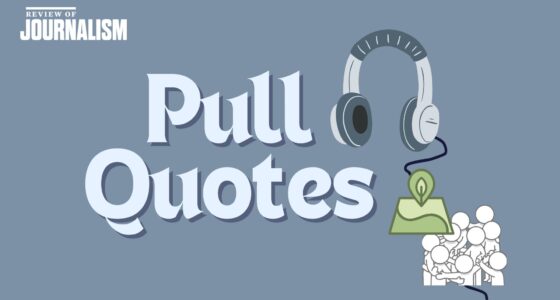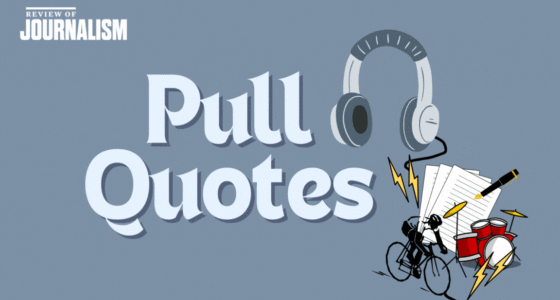Tuesday, May 11 marks the day the 2021 edition of the [ ] Review of Journalism is officially available in print, and a year’s work of love and obsession comes to a close.
The publishing of the Review is an annual tradition at the Ryerson School of Journalism, a rite of passage open to final-year undergrad and graduate students. The first edition of the magazine came out in 1984, and in recent years, the publication built up a digital archive, hosted events and conferences, as well as this podcast. But this year we have pulled off a first:we’ve produced everything in the Review entirely remotely.
With the onset of the pandemic, the Review – like the multitudes of other media organizations around the world – was forced to vacate its offices to embrace a working-from-home culture. Editorial meetings, including more tangible work like visual and production, were all completed through video chat and direct messaging.
As journalists, communication is our bread and butter. How our messages are perceived is incredibly important to us – otherwise, why would we be in this program? For this reason, once we came to terms with the fact that our roles would be entirely virtual this year, how we would communicate with each other became an incredibly important challenge.
“I thought there was a lot more labour in making sure that my messages that were written and going out to anyone in the team conveyed, at the very least, a neutral tone, if not overly excited and happy,” says Danielle Neri, the Managing Editor, Online for the [ ]RJ.
On this episode of the podcast, the print team spoke of being concerned that the tone of their messages would be misunderstood, communicating an urgency that wasn’t yet there. Consistently checking in on colleagues has a different ring to it when it comes across as a Slack message with perfect grammar or a scheduled phone call, versus a friendly “how are you?” while casually passing by in the production room. The result was extra time spent crafting messages that perfectly described the intent of the communiqué.
In hindsight, the exercise of ensuring that our communications were well thought out might have the benefit of improving our daily communication skills.
“University started feeling more and more like a community when we realized our struggles are collective and we can help each other through them by amplifying our voices,” says Saniya Rashid, the Review’s Chief of Research. “Even with professors, I had a new found appreciation for their continued investment in their students at this time. I experienced university in a more intimate way as ironic as it sounds.”
“I think everyone’s put a lot more care into how they approach one another, and I think that was a pretty big benefit that I hope is carried through this pandemic,” explains Neri.
Digital content continues its march forwards
This year, because many of the bookstores and shops that would carry the Review are closed due to the pandemic, the team decided to print fewer copies than in a “typical” year, forcing the business team to get creative and putting more pressure on the digital content to reach audiences.
“It was hard to kind of figure out how to do this,” says Leen Blaibleh, our Manager Editor, Business on determining a production run and magazine launch. Solutions included a virtual launch event with Brandi Morin and young journalists that directed attendees to the [ ]RJ website where they could read the content as well as subscribe to receive the magazine in person.
All told, however, this was a banner year for advertising and sponsorships. Blaibleh credits the space social distancing guidelines gave her to be able to reflect on the grassroots journalism community the Review is a part of, allowing her to find ways to nourish these relationships. Since it wasn’t as easy as sending copies of the published magazine to the offices of our sponsors (many media outlets across Canada are still closed due to COVID restrictions), she evaluated other options like digital and podcast ads.
The shift to an almost completely virtual campus meant that the pressure was on the digital team to manage the Review website like a well-oiled machine, pushing our current set-up to its limits and prompting conversations of expanding the Review team to include a webmaster or complete a digital re-design. These changes may or may not take hold in the future.
Only time will tell how this pandemic will impact the print versus online media landscape. Rashid sees the potential of a hybrid in-person/remote Review, and indeed for many other newsrooms as well, to increase collaboration on a level not seen before.
“…[T]his opens the door for collaborations earlier deemed impossible due to distance,” she explains. “I personally envision and hope for more collaborations with Canadian newsrooms from here in Pakistan. I see room for mutual growth and problem solving in today’s increasing digital age.”
No matter what happens, however, the charm and the nostalgia of the print magazine will endure.
“The fact that we still kept going and we came up with a physical publication really made a lot of people happy.“ says Blaibleh.
Thank you all so much for being a part of the fourth season of Pull Quotes. I hope you have enjoyed this series as much as we enjoyed creating it. A special thank you to all the guests who took time out of their busy schedules to speak to us, and to all the coaches and mentors who pointed us in the right direction. Finally, a very special thank you to our executive producer, Sonya Fatah, for putting in the extra work on an already busy production schedule to guide the Pull Quotes process.
We would also like to thank the sponsors of this week’s podcast, the Canadian Association of Black Journalists.
Anyone interested in buying a copy of the Review can do so here. Feature stories will be released individually throughout the summer, so keep checking our website or follow us on Twitter to read incredible stories of journalists around the world.
Credits:
Emma Jones, Podcast Editor & this week’s host
Joe Fish, Podcast Producer
Saniya Rashid, Chief of Research
Alex Ramsay, Fact Checker
Sonya Fatah, Executive Producer
Lindsay Hanna, Digital Content & Web Design Specialist

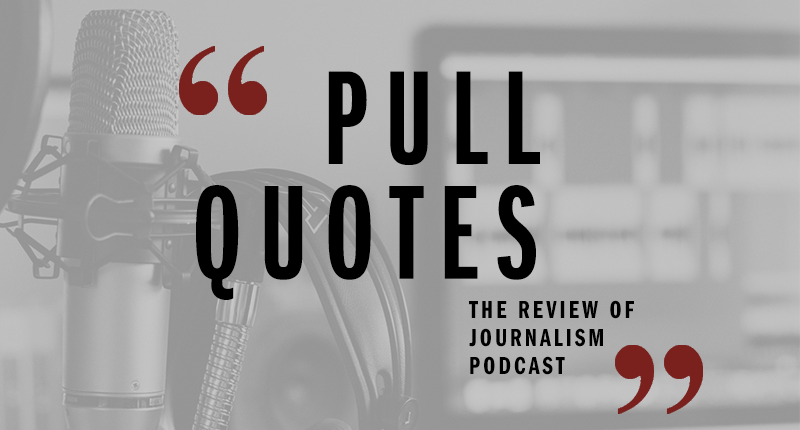
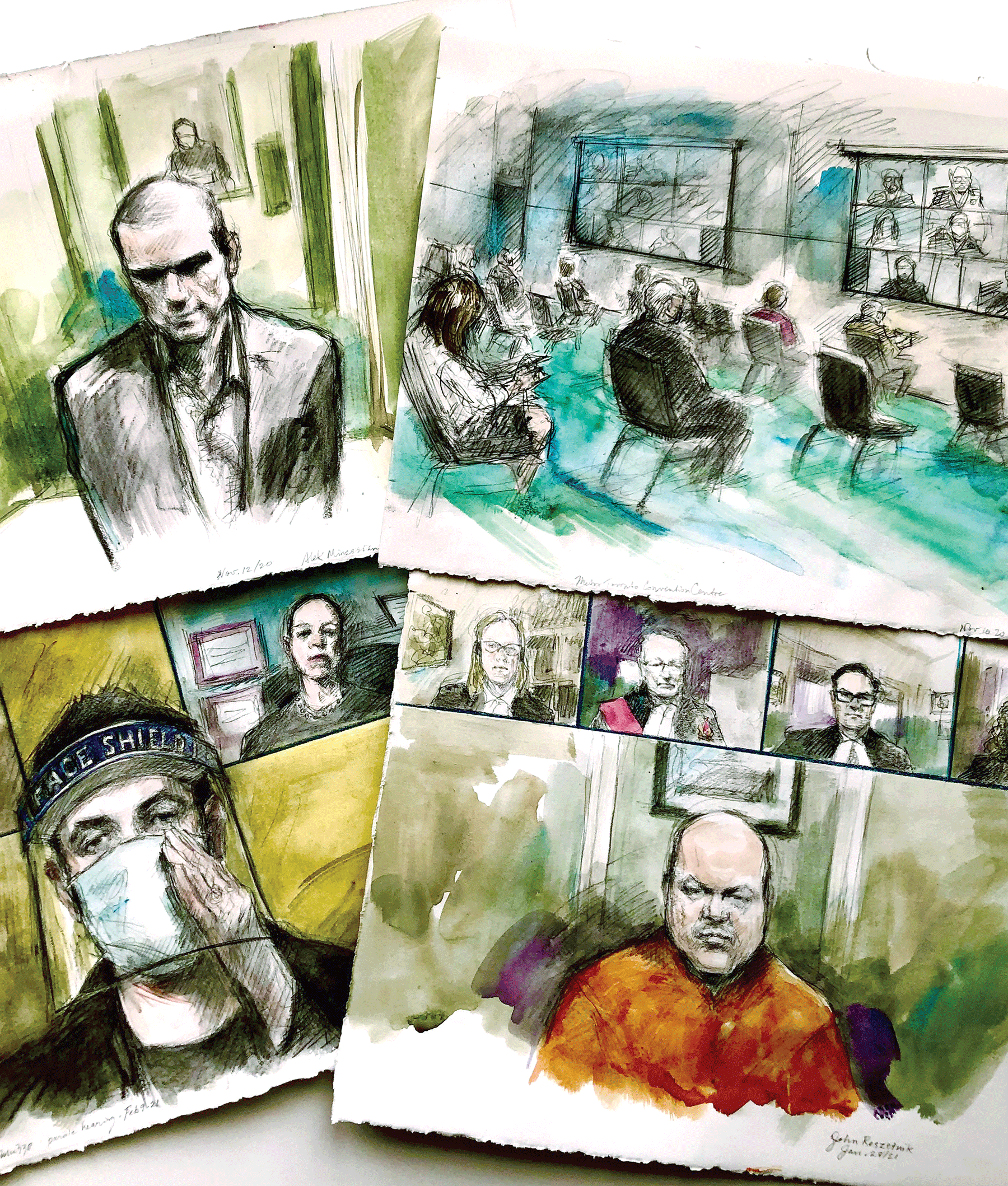
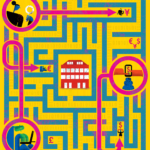
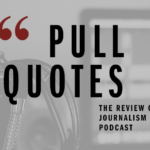
![Pull Quotes The [ ] review of journalism](https://s38447.pcdn.co/wp-content/uploads/2021/02/16x9-logo-scaled-1-150x150.jpg)


